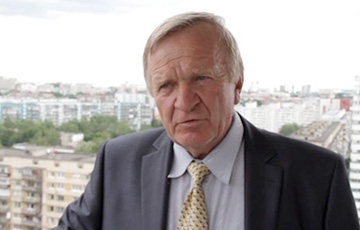Former Prime Minister of Belarus: The Country's Economy Is Gradually Moving Towards Default
6- 24.03.2021, 15:56
- 34,598

The state treasury consists of IOUs.
In February, Lukashenka ordered a freeze on the prices of socially important goods and some medicines.
In an interview with Charter97.org, former Prime Minister of Belarus Mikhail Chyhir assessed the actions of the authorities and said what Belarusians should expect in the future.
- As Prime Minister, you have already faced a similar situation in the fall of 1994. What does the administrative regulation of prices lead to?
- The command system of prices never led to anything good. Another thing is the monopolists who raise prices and profit from it. In this case, you can hold back the prices by some administrative method. Otherwise, it will end in deficit and speculation. We will not expect anything good from this.
- How did you manage to save the Belarusian ruble from a collapse?
- Firstly, we did not deal with the administrative regulation of prices. In 1994, Lukashenka thought that whatever he said, it would be so. They tried to keep prices down on bread, milk, and some other products.
Secondly, we received a loan from the International Monetary Fund.
Thirdly, we did not issue loans to commercial and state structures against government guarantees, which is actively observed now. And fourthly, I tried to fight the power structures to restrain their growth in numbers. Somewhere it worked, somewhere it did not.
When Lukashenka came to power, he declared that the treasury was empty, but now we can say that the treasury consists of promissory notes. It won't end well.
If we are talking about debts that have formed as a result of foreign exchange recoupment and profitable activities, then there is nothing wrong with that. But where does our currency go? In most cases, to maintain the exchange rate of the Belarusian ruble. For the economy, this is a road to nowhere.
- Now no one challenged Lukashenka's populist decision. What consequences can this lead to the economy and Belarusian consumers?
- Initially, it may seem that it is for the good of the people, for the people. But it only seems to be. If this path continues, there will be a shortage of goods. This will lead to unprofitable enterprises, both manufacturers and trading organizations. As a result, the state will receive a reduction in budget revenues. This is a well-known truth, there is nothing good about it.
- Recently, the media have often published photos of empty store shelves in various parts of our country. Can the events be called a consequence of Lukashenka's policies? How will the situation develop further?
- I don’t quite know why we have empty shelves. It is possible that in pursuit of an attempt to contain the collapse of the ruble exchange rate, the government does not allow many importers to enter the currency exchange. This includes limiting the profitability of trade enterprises. If a person knows that he will trade at a loss due to price containment, naturally he will reduce sales and trading.
There is still nothing particularly dangerous, but some commercial trade enterprises are already experiencing problems. To date, this is still a small amount. The most dangerous thing is massive, then there will be trouble.
- What can this lead to?
- Total deficit. Yes, we will save some amount, but then a sharp and unreasonable surge in prices awaits us. We have already gone through this.
- In recent years, inflation in Belarus has been steadily going up at a rather noticeable pace. Can we expect even more massive inflation and depreciation of the Belarusian ruble shortly?
- For some time this process may not be so fast, especially if we are again given a loan. But if there are problems with loans from Russia and China, then we will not have to wait long for the collapse of the ruble and the rise in prices.
- Experts note a high level of devaluation expectations among Belarusians: people massively take away the savings of their banks. What can the further outflow of currency from the banking system lead to?
- I recently looked at the statistics and would not say that there is a large outflow of currency. There was an outflow, but now it is not so noticeable. Ruble deposits are declining more actively, but there is no sharp outflow of foreign currency deposits. Therefore, it should not greatly affect the economy. However, if there is a large outflow, then this will be a huge problem for banks.
- How does a sharp outflow of currency affect banks?
- Both the bank and the Ministry of Finance will not be able to fulfill their obligations on their debts. It may even lead the country to default, which we are gradually moving towards.










